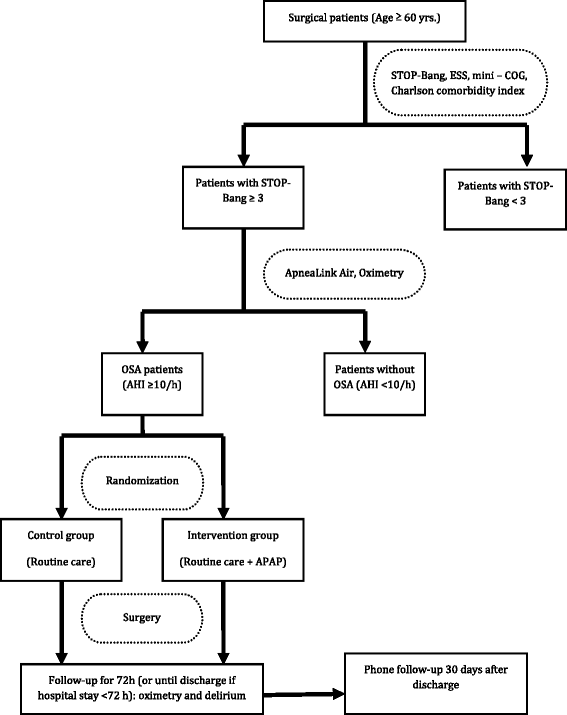The prevention of delirium in elderly with obstructive sleep apnea (PODESA) study: protocol for a multi-centre prospective randomized, controlled trial
- PMID: 29298664
- PMCID: PMC5751872
- DOI: 10.1186/s12871-017-0465-5
The prevention of delirium in elderly with obstructive sleep apnea (PODESA) study: protocol for a multi-centre prospective randomized, controlled trial
Abstract
Background: Delirium is a common problem that occurs in 5-50% of elderly individuals following surgery. Patients who develop delirium after surgery are at increased risk for serious complications. Recent studies suggest that patients with obstructive sleep apnea (OSA), a sleep disorder characterized by repeated episodes of complete or partial blockage of the upper airway - are at greater risk to develop delirium. OSA is more common in elderly individuals but is often undiagnosed. Identification and treatment of unrecognized OSA may reduce the incidence of postoperative delirium. However, few studies have investigated the effect of perioperative treatment of OSA to prevent postoperative delirium.
Methods: This multi-centre randomized controlled trial will enrol 634 elderly patients undergoing elective hip/knee replacement surgery. The study has been approved by the Research Ethics Boards of the three participating institutions. Patients will be screened with the STOP-Bang questionnaire. Those with a score of 3 or greater will have a portable home sleep study using the ApneaLink™ Air device. Patients identified to have OSA will be randomized to 1) Auto-titrating continuous positive airway pressure (APAP) applied during sleep for 72 h after surgery or until discharge if they are discharged before 72 h or 2) Control group - routine care, no APAP. All patients will be evaluated for delirium for 72 h after surgery or until discharge if they are discharged before 72 h. The primary outcome is the occurrence of delirium - assessed twice daily using the Confusion Assessment Method for 72 h or until discharge if the hospital stay is <72 h.
Discussion: Delirium is associated with increased morbidity and mortality, and higher healthcare costs. With the aging population, the incidence of postoperative delirium will likely increase as the number of elderly individuals undergoing surgery rises. The results of our study will be published in a peer-reviewed journal and presented at local and international medical conferences. Our study findings may lead to improved surgical outcomes, enhanced patient safety and reduced healthcare costs.
Trial registration: This study was retrospectively registered at clinicaltrials.gov NCT02954224 on November 3, 2016.
Keywords: Aged; Continuous positive airway pressure; Delirium; Obstructive; Perioperative period; Sleep apnea.
Conflict of interest statement
Springer Nature remains neutral with regard to jurisdictional claims in published maps and institutional affiliations.
Figures
References
Publication types
MeSH terms
Associated data
LinkOut - more resources
Full Text Sources
Other Literature Sources
Medical


